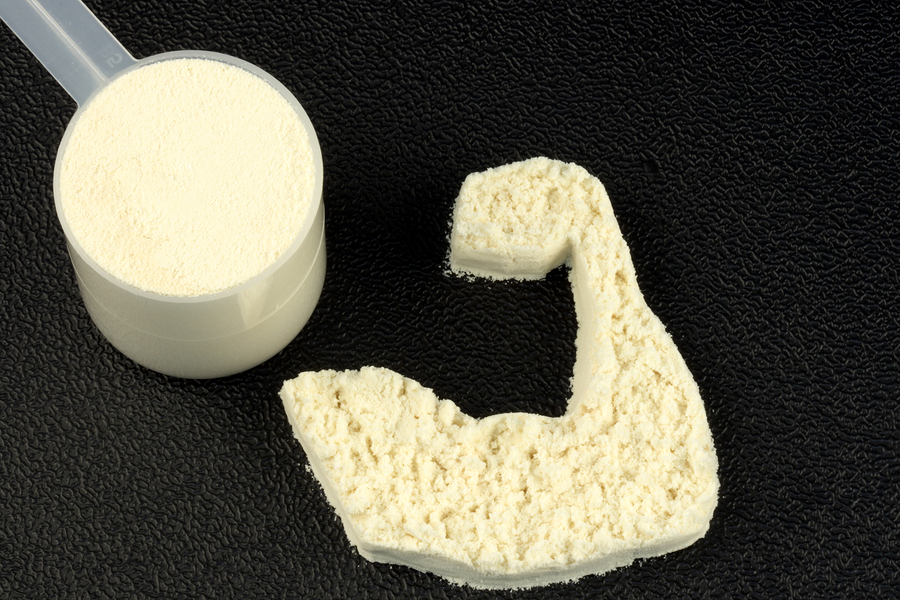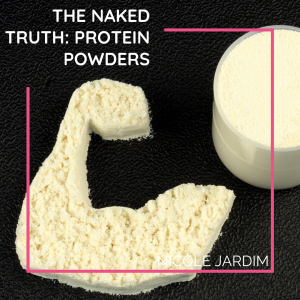Ladies, who else wants to know the truth about protein powder? Isn’t it a tricky subject? This is a hot topic with a lot of confusion around it. I hope these tips will help you to feel empowered the next time you are shopping for protein powder.
What I dislike about protein powder:
#1. They contain loads of sugar
My primary beef with protein shakes and smoothies is the amount of sugar and fake sweeteners in them. Sugar destroys our health. It promotes diseases like diabetes, heart disease, and cancer plus it damages our eyes, makes us fat, and gives us wrinkles. Be cautious when looking at labels and try to find protein powders without added sweeteners.
If you must have a sweetener, consider using a product sweetened with stevia. Additionally, be cautious with fruit sugars. Many people put way too many bananas and tropical fruits in their smoothies. If your smoothie has more fruit in it than you would eat in one sitting, then it’s too much. For example, would you eat one whole banana, 2 dates, and a handful of raspberries at one time? Probably not!
#2. Protein powders are processed foods
One overriding truth that we need to always keep in mind when purchasing a protein powder is that they are all processed foods. And as processed foods go, they have snazzy labels, enticing health claims, and promises for eternal life (well sort of). Take these labels with a grain of salt.
I believe that we should always eat real food as our first choice. There are micronutrients associated with real food that are not associated with protein powders. Protein powders lose some nutrients as they go through the processing required to transform them into powders.
Scientists and food creators then add the nutrients back in by adding manufactured vitamins and minerals to the final product. These products will often say “fortified with” (insert vitamin name). Whole foods are ALWAYS the best source of nutrients! i.e. eating a fillet of salmon is better for you than drinking a protein powder.
#3. They are made from cheap, low value products
In my opinion, sourcing is key when it comes to protein powder. Many protein powders are made from low quality products such as soy, rice, and pasteurized non-grassfed cow’s milk. Typically, these protein powders are not sourced from high quality, organic, or pastured locations. Soy is the primary cheap ingredient I see in protein powders. Soy has been mistakenly identified as a health food.
The original studies glorifying soy were based on fermented soy products that were found in the Japanese diet such as soy sauce and tempeh. Today, we do not typically eat soy in it’s healthy fermented state. Soy in the USA, is a $4 billion business toting soy yogurts, soy chips, soy based vegan meats and cheeses as healthy. The truth is that the hormones in soy can be destructive to your health.
According to Dr. Joseph Mercola, “Women are particularly vulnerable to soy phytoestrogens and isoflavones as they are potent goitrogens leading to impaired thyroid health, fatigue and infertility.” (**Vegans, stay with me, I have suggestions for you below.)
#4. Protein powders may promote allergic responses
Many people have allergies to protein powders such as milk casein or egg protein. Casein is a protein fraction of milk that is used in many protein powders. I suggest, experimenting with various types of protein powders to find the one that works best for you.
For example, I have allergy symptoms such as bloating, grogginess, constipation and/or diarrhea when using standard milk or whey based protein powder. However, when I switched to using Bullet Proof Protein Powder from happy grass fed cows, my symptoms were significantly reduced. If you do have a sensitivity to milk or eggs consider adding leucine (I explain what leucine is below) to a lower quality protein source such as hemp seed powder to amp up the value.
What I like about protein powder:
#1. Protein smoothies can be an excellent, on-the-go meal
Awesome kitchen products like The Magic Bullet, immersion blenders, and water bottles make smoothies an easy meal to transport.
#2. They can assist with weight loss
Protein powder smoothies have a great satiating effect. A recent study, as reported in the American Journal of Clinical Nutrition, stated that a high protein breakfast can prevent overeating and snacking later in the day. Having a protein smoothie for breakfast can be a helpful way to start the day because it is very satiating and will prevent the desire for snacking. Be cautious when making your smoothie. Do not overload your smoothie with too many ingredients. A simple smoothie with protein powder, almond milk, a handful of blueberries and ice is delicious, nutritious, and has a low overall impact on weight gain.

#3. Protein powders can help ladies consume more protein
In my experience with training women, we have a tendency to overestimate the amount of of carbohydrates we need post workout and under estimate the amount of protein. Protein smoothies can be an excellent way to squeeze in some protein without having to eat a whole omelette. I find that ladies do not tend to eat protein at breakfast so this is a helpful way to have a light breakfast that incorporates protein.
When using protein powder as a meal replacement, I recommend 25 to 30 grams of protein per smoothie. Generally, this is slightly more than one scoop in most standard protein powders.
#4. They assist with workout recovery
One of the primary reasons people drink protein shakes is to help with post workout recovery. Protein powders can help repair the damaged muscle tissue that can occur from a strenuous workout. If you are not doing a really tough workout, you probably do not need a protein smoothie. Your next healthy meal will meet your needs. The fuel you use should depend on how hard you train.
In my experience most people do not need a high carbohydrate load post workout unless they are training for a high impact event such as a figure competition. I do not advise adding syrups or sugars to your post workout smoothie or shake.
#5. Smoothies can be a great way to eat more greens
Add a handful of greens such as kale or spinach to any smoothie. This will add a punch of nutrients with little impact on the flavor. I recommend this method over juicing as the entire pulp and fiber of the plant will be included in the smoothie.
What are the high-value, organic protein powders and where can I buy them?
- Bullet Proof Whey Protein from happy pastured cows.
- Collagen powder – technically this isn’t protein powder but it’s got a good amount of protein along with a full amino acid profile, and lots of healing properties!! I love Vital Proteins Collagen Peptides and Great Lakes Collagen Hydrolysate.
- Navitas Naturals Pure Hemp Seed Powder is the best source of plant-based protein
- Consider upgrading any vegan or vegetarian protein powder by adding 3 grams of leucine. Leucine, an essential amino acid, helps to promote muscle recovery. You can add a scoop of leucine supplement directly to your smoothie. Consider using Source Naturals leucine powder found on Amazon.
- If you prefer a completely vegan source of leucine, consider adding a scoop of 3 grams of spirulina such as Sunburst Foods Raw Spirulina Powder.
I hope these tips helped to shed some light on protein powders and your smoothie making experience!




4 thoughts on “The Naked Truth: Protein powders”
I came searching for this topic on your sight because I trust your opinion. Specifically, I have some pea protein powder (which has pumpkin seed powder in it too). I recently heard from a functional health doctor that it has or can cause high estrogen levels. And, not long after using it, I noticed breast tenderness & even swelling, long before that time of the month. I just want to know if I should throw it away. I do not want to increase my estrogen levels! I haven’t noticed problems when I use a beef based protein powder. Your advice is appreciated!
I also am curious about your take on Garden of Life (Organic Plant Protien). It’s vegan/organic/grain free protein that has no sugar and (obviously) no added sugar.
Another brand is Terra’s Organic 100% Pumpkin Protien Powder. There is 1 gram on sugar per serving. No added sugar.
Would you recommend Garden of Life plant protein powders?
Very helpful Nicole! This article hit home for me as I struggle when shopping for healthy products in general – sifting through all the crap out there! I’m not big on protein powders but I recently bought one to add to smoothies and homemade “açaí bowls” (before reading this post). Wish I could upload a photo but it’s called “Organic Traditions – probiotic smoothie mix”. I did a double check of the ingredients after reading your article – from what I can tell looks like I made a good choice but still difficult to know if the ingredients are properly sourced, high value.